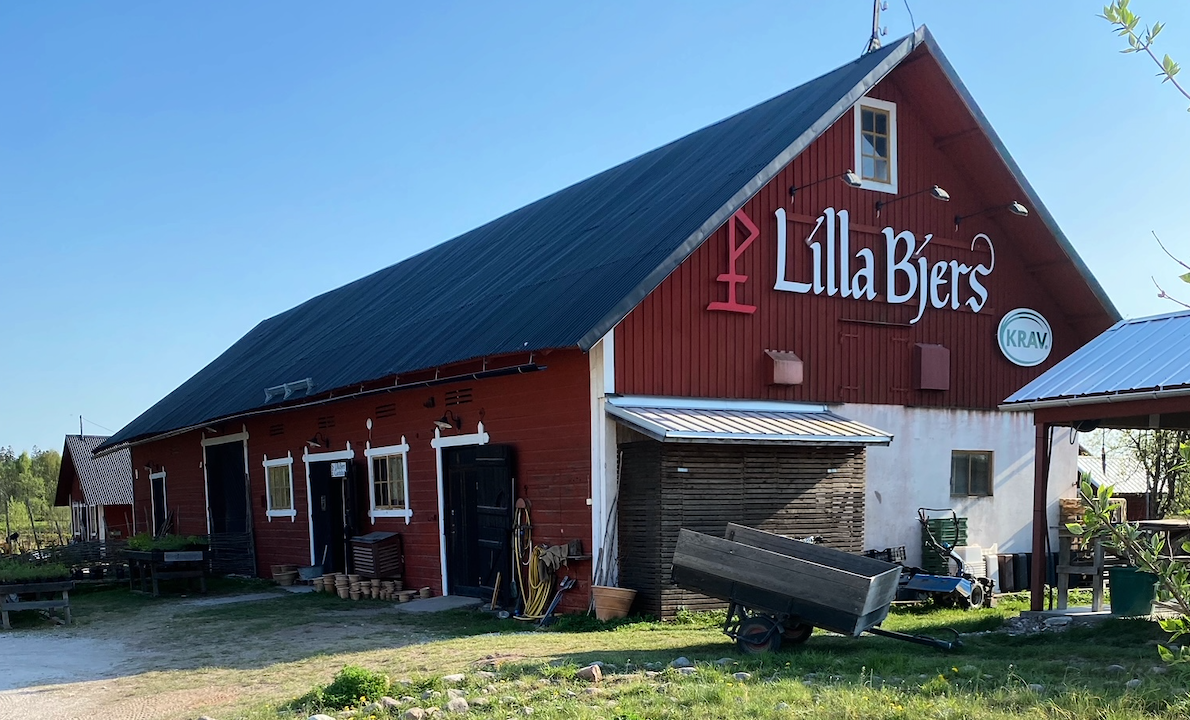“The Farm Kitchen conveys 25 years of experience in sustainable vegetable cultivation that’s directly linked to a circularly functioning restaurant business. The inspiration days on the farm have already led to the spread of knowledge to other businesses. By developing the educational content and making the knowledge available to all of Sweden’s restaurants, there is great potential here to influence the future of the industry.” Motivation of the jury.
illa Bjers is a vegetable farm with its own farm shop and restaurant, 7km south of Visby on the island of Gotland. It comprises 19 hectares of sandy soil that has been KRAV-certified since 2001. Most of the crops are grown in open fields, but there are three polytunnels for those that require a little more heat. More than 300 types of crops are processed, prepared and served in the farm restaurant and sold in the shop. Since the start in 2012, the restaurant has been KRAV-certified at the highest level.
Holistic thinking and cycles are important in how the farm is laid out. The water supply is circular, no fossil fuels are used in production, and around 50 chickens take care of the vegetable waste. There are bee colonies for pollination and honey production, and spotted vine snails, an example of food of the future with historical origins, are cultivated here too.
Lilla Bjers is run by the Hoas family – Margareta, Göran and their children Elin, Agnes and Einar. But other employees are just as important to the business, such as restaurant manager Sandra Göransson and Elin Hoas partner Sebastian Nordvall. Elin, who is in charge of the orchards and bee colonies, highlights one aspect of what characterises their way of working.
– What is unique is that we work in such an integrated way, we can jump around and help each other in all positions, both those of us who work all year round and the seasonal staff.
The family and their team have 25 years’ experience of running the farm in this way. This has made Lilla Bjers a nursery not only for plants but also people. Over the years, young chefs and knowledge-hungry individuals from other professions have gained experience and understanding of how a small farm can work ecologically and cyclically. They learn how to optimise the season’s crops, to use them in the best possible way and to make them last all year.
In order to spread knowledge and experience beyond Lilla Bjers, the team has developed Gårdens Kök, The Farm Kitchen, a two-day training and inspiration program aimed at chefs and other restaurant staff, but also at companies and interested people outside the industry. The farm’s kitchen is a forum for discussion and development where anyone who wants to learn how to work in a more sustainable and circular way is welcome to participate. The first training days started in 2020, then the pandemic put development on hold – until now.
The training begins by relating the story of Lilla Bjers and its focus on organic farming. There is plenty of time for walking around, asking questions and tasting crops. During the afternoon and evening, the participants prepare a dinner together with the chefs in Lilla Bjers kitchen using ingredients from the farm. The meal is enjoyed in a greenhouse right in the middle of the farm. On day two, topics such as cultivation technology, fermentation, biological diversity and climate-smart thinking are covered. A lot of time is spent discussing the practice of cultivation from seed to plate and how that shapes the restaurant menu.
The training days take a comprehensive approach to sustainability, from ecological, economic and social standpoints. They also link to global sustainability goals, clean water and sanitation.
– My dream is for us to have a large range of courses on the farm, spreading the skills we already possess and the skills we will build up over the coming years, says Elin Hoas. People are becoming more and more interested in that kind of information. We see that the organic trend is starting to decline, and we hope to turn it around again.
Lilla Bjers is open on weekends from April to June, extending to every day during the high season. From September to Christmas, it goes back to weekend opening. Elin sees the greatest opportunities for holding the training days directly before and after the high season.
– We are also thinking about launching a course that starts in spring and continues into autumn. The farm looks so incredibly different in different seasons, and it would be cool for people to experience that.
Lilla Bjers will receive coaching from Circular Gastronomy to further develop the concept in collaboration with the strategy agency Hint. Hint are experts in insight work, packaging and communication and, among other things, will help develop activities that can be launched on the farm outside of high season.
